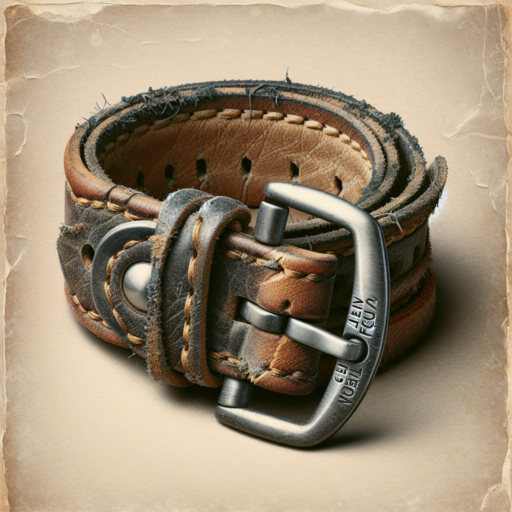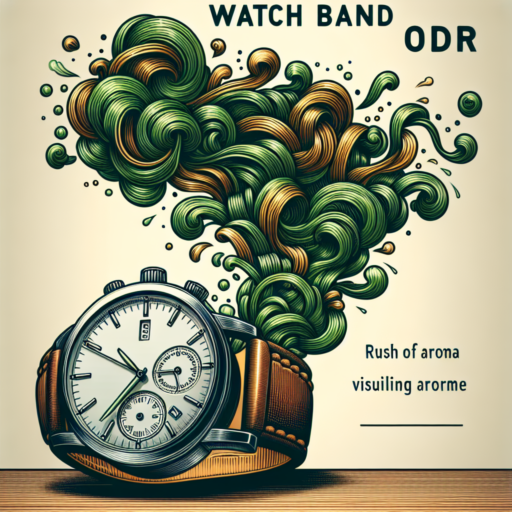Why Your Watch Band Smells Bad: Uncovering the Causes
Have you ever noticed a lingering bad smell coming from your watch band and wondered what could be causing it? This common issue can be both embarrassing and unpleasant, but understanding the root causes is the first step towards finding a solution.
Sweat and Moisture Accumulation
The primary culprit behind a stinky watch band is often sweat and moisture accumulation. As you go about your daily activities, your watch band absorbs sweat from your wrist. This moisture provides a perfect breeding ground for bacteria, which can lead to odor. Furthermore, if you don’t allow the band to dry out properly before wearing it again, this problem can become chronic, trapping the smells and making them harder to eliminate.
Materials Matter
Different materials react differently to sweat and moisture. For instance, leather bands can absorb sweat and oils from your skin, which over time may lead to a musty smell. In contrast, metal bands might not absorb sweat but can still trap moisture between the band and your skin, potentially leading to rust or mildew. Silicone or rubber bands, popular for their durability and waterproof qualities, can also start to smell bad if not cleaned regularly, as they can trap dead skin cells and sweat.
Recognizing the reasons behind the bad odor of your watch band is crucial in addressing the issue effectively. Whether it’s due to the material of your band or the lifestyle you lead, solutions exist to mitigate this problem, ensuring your watch remains a fresh and pleasant part of your daily wear.
Preventive Measures: How to Keep Your Watch Band from Smelling
Maintaining a fresh-smelling watch band is crucial for both hygiene and comfort. Taking preventive measures can help avoid the unpleasant situation where your watch band starts emanating an undesirable odor. Here’s how you can keep your watch band smelling fresh.
Clean Regularly
Regular cleaning is the cornerstone of preventing any bad smells. For leather bands, use a damp cloth with mild soap, but ensure it’s thoroughly dried afterwards to prevent mildew. For metal, silicone, or rubber bands, a gentle scrub with soap and water followed by a dry wipe works wonders. A routine cleaning schedule, depending on the frequency of use, keeps odors at bay.
Store Properly
How and where you store your watch can affect its smell. Ensure your watch band is completely dry before storing it and try to keep it in a well-ventilated area. Avoid damp, enclosed spaces like bathrooms, as humidity can encourage bacterial growth, leading to odors.
Wear Alternately
Giving your watch (and band) a break is a good practice. Wearing the same watch band daily can lead to accumulation of sweat, skin cells, and products that can decompose and produce a bad smell. Alternating between bands allows them to air out and reduces the chances of odor development.
Step-by-Step Guide: Cleaning Your Stinky Watch Band at Home
Is your favorite timepiece starting to give off an unpleasant odor? It’s a common issue, but, thankfully, cleaning your stinky watch band is a breeze with the right approach. Given the variety of materials watch bands are made from, it’s crucial to identify your band’s material before diving into the cleaning process. Whether you’re dealing with leather, metal, silicone, or nylon, this guide will walk you through the essential steps to get your watch smelling fresh again.
Identify Your Watch Band Material
First things first, examine your watch band to determine its material. This is vital as each material requires a specific cleaning method to avoid damage. For instance, leather bands necessitate a gentler cleaning solution to prevent drying and cracking, whereas metal bands can endure more vigorous scrubbing.
Cleaning Method for Leather Bands
For those with leather watch bands, begin by wiping away any surface dirt with a dry, soft cloth. Next, prepare a mild soapy solution using water and gentle soap. Dampen a cloth with the solution and gently clean the band on both sides. Be careful not to soak the leather. Once clean, pat the band with a dry cloth and allow it to air dry completely before reattaching it to your watch. Regular cleaning not only keeps odors at bay but also extends the life of your leather band.
Cleaning Method for Metal, Silicone, and Nylon Bands
Metal, silicone, and nylon bands can typically endure more water exposure during cleaning. Start by removing your watch band from the watch to prevent water damage to the watch itself. Use a soft-bristled brush or a cloth with soapy water to scrub the band clean. Pay special attention to any crevices where odor-causing bacteria might reside. Rinse the band thoroughly under clean water and dry it with a soft cloth. For metal bands, consider using a little bit of rubbing alcohol on a cloth to finish off the cleaning, ensuring it shines and is free of bacteria.
Certainly! Here’s a focused piece of content for your H2 header:
5 Instant Fixes for a Smelly Watch Band
If you’re dealing with the discomfort of a smelly watch band, rest assured that there are quick and easy solutions you can apply. Over time, watch bands can absorb sweat, dirt, and grime, leading to unpleasant odors. However, with these immediate fixes, you can bring freshness back to your wrist accessory in no time.
1. Soap and Water
Start with the basics: cleaning your watch band with soap and water. Using a gentle, non-abrasive soap and a soft brush can remove the built-up sweat and dirt that’s causing the smell. It’s crucial to dry your band thoroughly to prevent any moisture-related issues.
2. Vinegar Solution
Mixing equal parts of water and vinegar and applying it to your watch band can neutralize odors. After letting it sit for a few minutes, thoroughly rinse the band and let it dry. Vinegar is especially effective for materials like silicone or rubber.
3. Baking Soda Paste
For more persistent smells, creating a paste using baking soda and water can be a game-changer. Apply the paste to the band, let it sit for a few hours, and then rinse it off. Baking soda naturally absorbs odors and is gentle on various materials.
Each of these methods provides a quick solution to eliminate unpleasant odors from your watch band. Depending on the material of your watch band, one method may work better than others. You may also want to consider regular cleaning to prevent the smell from returning. Remember, the key to a fresh-smelling watch band lies in simple, regular maintenance.
No se han encontrado productos.
When to Replace Your Watch Band: Signs It’s Beyond Repair
Learning to identify when your watch band is beyond repair is crucial to maintaining not only the aesthetics but also the functionality of your timepiece. Various signs can indicate it’s time for a replacement, ensuring that your watch remains a reliable accessory for your daily needs. Recognizing these indicators can save you time and the potential cost of investing in unnecessary repairs.
Visible Wear and Tear
One of the most apparent signs that your watch band needs replacing is visible wear and tear. This includes any cracks, fraying, or fading in the material. Leather bands may show signs of excessive drying out or cracking, while metal bands could have bent or broken links. Rubber or silicone bands can also become brittle and start to break. These visual cues are often indicative of a band that has reached the end of its lifespan and requires replacement.
Difficulty in Securing the Watch
If you’re finding it increasingly difficult to secure your watch around your wrist, it could be a sign that the band needs replacing. This difficulty could be due to a stretched band, broken clasps, or malfunctioning pins. Bands that no longer adjust or secure properly can result in your watch being loose and more prone to damage from slipping off. It’s essential to acknowledge these functional impairments as clear indications that your watch band might be beyond repair.
Recognizing when it’s time to replace your watch band is crucial for keeping your timepiece in prime condition. From visible wear and tear to difficulties in securing it properly, these signs should not be overlooked. Addressing these issues promptly can extend the life of your watch, ensuring it remains a cherished accessory for years to come.
Choosing the Right Material: Watch Bands That Don’t Stink
When selecting a watch band, it’s crucial to consider not just the look or style but also the material’s ability to resist unpleasant odors. Certain materials, especially those that are non-porous, are better at keeping bacteria at bay, which is the primary cause of those unwanted smells. This consideration becomes particularly important for individuals with active lifestyles or those who live in warmer climates, where sweat can be a frequent issue.
Durable and Odor Resistant Materials
Silicone and stainless steel are popular choices for watch bands specifically because they are both durable and less likely to harbor bacteria that can lead to odors. Silicone, being non-porous and easily washable, can be quickly cleaned with soap and water, making maintenance a breeze. On the other hand, stainless steel offers a sleek look while also being highly resistant to corrosion and stains, including those from sweat and other moisture.
Natural Options: Leather and Canvas
For those who prefer natural materials, leather and canvas offer unique advantages. However, it’s important to note that they require more careful maintenance to prevent odors. Leather, when treated properly, can be quite resistant to sweat and develop a rich patina over time. Meanwhile, canvas bands are lightweight and breathable, which reduces the buildup of moisture. Yet, they might need regular cleaning to remain fresh. Ideally, choosing treated or high-quality versions of these materials can add longevity and comfort.
Understanding the relationship between material choice and odor prevention is key in finding a watch band that remains fresh over time. Whether you lean towards synthetic or natural options, selecting a material that suits your lifestyle while also considering its maintenance needs will ensure your watch band stays odor-free and comfortable to wear day in and day out.
The Science Behind the Stink: What Causes the Odor in Watch Bands
Understanding the unpleasant odors emanating from watch bands begins with a look into the compounds and bacteria involved. Watch bands, whether made from rubber, leather, or cloth, can become breeding grounds for bacteria and fungi. This is especially true when they are exposed to sweat, moisture, and other elements that contribute to their deterioration and the subsequent odorous development.
Frequent contact with skin oils and sweat is unavoidable for items worn close to the body like watches. These substances are organic materials that bacteria feed on, producing gases and compounds as waste, which are the primary sources of the foul smell. Particularly, the bacteria Staphylococcus epidermidis, which is commonly found on human skin, plays a significant role in breaking down these secretions on watch bands.
Moreover, the material of the watch band significantly affects how odors develop and persist. For example, rubber and synthetic bands tend to trap more moisture compared to metal bands, providing a more hospitable environment for bacteria and fungi. Leather bands absorb sweat and oils more readily, which can lead to a strong smell if not cleaned regularly. Understanding these factors is crucial for addressing and preventing the unpleasant stench often associated with well-worn watch bands.
Professional Help: Where to Get Your Watch Band Cleaned
Seeking professional help for cleaning your watch band is crucial, not only to maintain its appearance but also to ensure its longevity. While it’s possible to perform basic cleaning at home, professional cleaning goes a step further in preserving the integrity of your watch. This involves detailed attention to the type of material, whether it’s leather, metal, silicone, or nylon, and utilizing the correct cleaning methods and solutions.
Many local jewelry stores offer watch cleaning services that include the watch band. This is often the most convenient option as these professionals have the expertise and the appropriate tools to clean without causing damage. Ensure to inquire if they specialize in your watch’s specific material to guarantee the best care.
Authorized watch dealers and service centers are also excellent sources for getting your watch band cleaned. These facilities not only deep clean but can also perform maintenance on the watch mechanism if needed. Visiting an authorized center ensures that your watch is handled according to the brand’s standards, using proprietary techniques and tools for cleaning and maintenance.
For those who prefer the convenience of not leaving their home, there are reputable online services that offer watch band cleaning. You can mail your watch to their facility where it will be cleaned, and possibly serviced, before being sent back to you. This option is excellent for individuals with high-value or luxury watches who require specialized care.
DIY Solutions vs. Professional Cleaning: What’s Best for Your Stinky Watch Band?
Deciding between DIY solutions and professional cleaning for your stinky watch band can feel like navigating through a maze of options. On one side, DIY methods offer a cost-effective and immediate remedy that you can do at home using common household items. On the other, professional cleaning ensures a thorough cleanup handled by experts, potentially prolonging the life of your watch band. Both options come with their merits and limitations, affecting their suitability depending on the material of your band and the severity of the odor.
Understanding the Causes of a Stinky Watch Band
Before deciding on the best cleaning method, it’s crucial to understand the causes behind a smelly watch band. Factors such as sweat, dirt, moisture, and bacteria accumulation contribute to unpleasant odors, especially in bands made of porous materials like leather or nylon. Recognizing the root cause of the stink can guide you in selecting the most effective cleaning technique, whether it’s a simple DIY fix or a professional service.
Exploring DIY Cleaning Solutions
DIY cleaning methods for deodorizing watch bands offer a quick and accessible solution. Simple ingredients like soapy water, baking soda, or vinegar can be effective in eliminating odors from materials like silicone or rubber. However, it’s important to proceed with caution when dealing with delicate materials such as leather, as harsh chemicals can cause damage. The convenience and cost savings of DIY solutions are significant advantages, but they may not always reach the thoroughness a professional clean could achieve, particularly for persistent or deep-set odors.
FAQ: Everything You Need to Know About Dealing with a Stinky Watch Band
Dealing with a stinky watch band is a common problem that can be both embarrassing and annoying. Fortunately, understanding the causes and knowing the right solutions can make a big difference. This FAQ section addresses some crucial queries to help you keep your watch band smelling fresh.
What Causes a Watch Band to Smell?
The main culprits behind a stinky watch band include sweat, dirt, bacteria, and sometimes even the materials of the band itself. Sweat is the most common cause, as it accumulates over time, especially in materials like leather or non-breathable plastics, leading to an unpleasant odor. Additionally, environmental factors and your skin’s natural oils can also contribute to the problem.
How Can I Clean My Watch Band Effectively?
Cleaning your watch band effectively depends on its material. For leather bands, it’s recommended to use a gentle leather cleaner and a soft cloth, avoiding excessive water that can damage the material. For silicone or rubber bands, a mix of water and mild soap usually does the trick. Remember to dry your band thoroughly after cleaning to prevent moisture from getting trapped and causing further odor or damage.
Preventative Measures to Keep Your Watch Band Fresh
Preventing your watch band from developing a stench in the first place is key. Always dry your wrist and band after exercising or exposure to water. Consider alternating between bands to give them time to air out, and don’t forget to give your band a regular cleaning, tailored to its specific material needs. These simple steps can significantly extend the fresh life of your watch band, ensuring it remains odor-free for longer.



